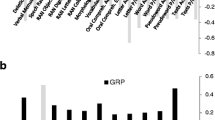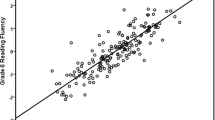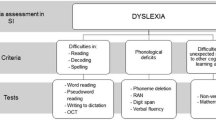Abstract
Long before the establishment of a general school system in Sweden (1842), a vast majority of the adult population had reached some reasonable level of reading literacy. The level of reading skill among the members of a household was assessed by the parish priest at annual catechetical examinations, and the results of these examinations were recorded in church registers. Eventually (in the 18th century) a 5-point grading scale was developed. In the present investigation, these unique records were used to study the transmission of low reading marks over successive generations in 17 families. For comparison, a set of 17 family trees originating from good readers was traced. The average scores of the descendants of poor readers were significantly lower than corresponding scores for descendants of good readers. However, the transmission patterns in the family trees of poor readers did not indicate any simple genetic mechanism. In another study, two dyslexic cases living today were traced backward to ancestors born around 1750. In one of the cases, a massive familial pattern of reading disability down to the eighth generation was observed, while most ancestors of the other case had average or above average reading skill as judged by the priests. The reasons for the absence of a simple hereditary pattern were critically discussed.
Similar content being viewed by others
References
A. Ansara, N. Geschwind, A. Galaburda, M. Albert, and N. Gartrell. 1981. (eds.).Sex Differences in Dyslexia. Towson, Md.: The Orton Dyslexia Society.
Boder, E. 1973. Developmental dyslexia: A diagnostic approach based on three atypical reading and spelling problems.Developmental Medicine and Child Neurology 14:663–687.
Carter, C. O. 1973. Multifactor genetic disease.In V. A. McKusick and R. Claiborne (eds.).Medical Genetics. New York: HP Publishing Company.
Chall, J. S. 1983.Stages of Reading Development. New York: McGraw-Hill.
DeFries, J. C., and Decker, S. N. 1982. Genetic aspects of reading disability: A family study.In R. N. Malatesha and P. G. Aaron (eds.).Reading Disorders: Varieties and treatments. New York: Academic Press.
Doehring, D. G. 1984. Subtyping of reading disorders: Implications for remediation.Annals of Dyslexia 34:205–216.
Fisher, J. 1905. Case of congenital word-blindness (inability to learn to read).Ophthalmic Review 24:315–318.
Galaburda, A. 1983. Developmental dyslexia: Current anatomical research.Annals of Dyslexia 33:41–53.
Geschwind, N. 1983. Biological associations of left-handedness.Annals of Dyslexia 33:29–40.
Gjessing, H.-J. 1980. Reading disability: Diagnosis based on psycho-educational analysis of the learning function.Forty-fourth Yearbook, Claremont Reading Conference.
Hallgren, B. 1950.Specific Dyslexia (“congenital word-blindness”): A clinical and genetic study Copenhagen: Munksgaard.
Hermann, K. 1959.Reading Disability: A medical study of word-blindness and related handicaps. Copenhagen: Hunksgaard.
Herschel, M. 1978. Dyslexia revisited: A review.Human Genetics 40:115–134.
Johansson, E. 1977. The history of literacy in Sweden in comparison with some other countries. Educational Reports. Umeå. No 12.
Lewitter, F. I., DeFries, J. C., and Elston, R. C. 1980. Genetic models of reading disability.Behavior Genetics 10:9–30.
Lundberg, I. 1983.Läs- och skrivsvårigheter i ljuset av aktuell forskning. Stockholm: Skolöverstyrelsen.
Lundberg, I. 1985. Longitudinal studies of reading and reading difficulties in Sweden.In G. E. MacKinnon and T. G. Waller (eds.).Reading Research. Advances in theory and practice. New York: Academic Press.
Mattis, S., French, J. H., and Rapin, I. 1975. Dyslexia in children and young adults: Three independent neuropsychological syndromes.Developmental Medicine and Child Neurology 17:105–163.
McClearn, G. E. 1978. Review of “dyslexia—genetic aspects.”In A. L. Benton and D. Pearl (eds.).Dyslexia. An appraisal of current knowledge. New York: Oxford University Press.
Nordström, S., and Barkman, Y. 1976. Hereditary macular degeneration (HMD) in 246 cases traced to one gene-source in central Sweden.Hereditas 84:163–176.
Owen, F. W. 1978. Dyslexia—genetic aspects.In A. L. Benton and D. Pearl (eds.).Dyslexia. An appraisal of current knowledge. New York: Oxford University Press.
Satz, P., and Morris, R. 1980. Learning disability subtypes: A review.In F. J. Pirozzolo and M. C. Wittrock (eds.)Neuropsychological and Cognitive Processes in Reading. New York: Academic Press.
Skydsgaard, H. B. 1942.Den konstitutionelle Dyslexi. “Ordblindhed”. En klinisk Studie. Kobenhavn: Arnold Busck.
Stephenson, S. 1907. Six cases of congenital word blindness affecting three generations of one family.Ophtalmoscope 5:482–489.
Thomas, C. J. 1905. Congenital “word blindness” and its treatment.Ophtalmoscope 3:380–385.
Author information
Authors and Affiliations
Additional information
This research was supported by a grant from the Swedish Council for Research in the Humanities and the Social Sciences. Birgitta Esberg served as research assistant.
Rights and permissions
About this article
Cite this article
Lundberg, I., Nilsson, LG. What church examination records can tell us about the inheritance of reading disability. Annals of Dyslexia 36, 215–236 (1986). https://doi.org/10.1007/BF02648031
Issue Date:
DOI: https://doi.org/10.1007/BF02648031




